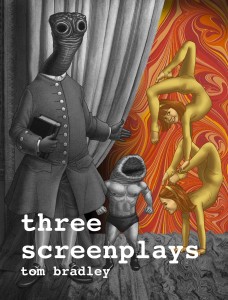Tom Bradley Interview
by Tom Bradley and John Wisniewski
 (JW) Tell us about writing Three Screenplays. Were these intended for the screen, or written as literary works?
(JW) Tell us about writing Three Screenplays. Were these intended for the screen, or written as literary works?
(TB) Three Screenplays is a collection of featurelength movie scripts that employ spoken dialogue and presenttense actionbut no voiceovers, narration, flashforwards or backs, and no stupid fucking special effects. The lines are to be delivered, as opposed to grunted or yammered or improvised.
These movies are intended for production. In the meantime, however, since they're published on paper, you'll be watching Three Screenplays long after that Great Day when the electrical grid collapses once and for all.
The traditional predigital Hollywood script format is fascinating. If the prescribed font is used, and the correct margins observed (as in the layout to this book), it translates to one minute of screen time per page. Directors proceed on this assumption. There’s an uncanny precision to screenwriting that carries pleasantly over into the eyeball, as in the movie itself. It’s like a Shakespearean sonnet: our pleasure is enhanced when we see the fourteen lines, ended just so, with the final couplet nicely indented. Same idea with screenplays. The result is a particular kind of story, with that compelling balance of dialogue and action, and tight economy of setting and exposition.
The collection's first script made the top fifteen percent in the Nicholls contest, administered by the Academy of Motion Picture Arts and Sciences.
Three Screenplays is dedicated to John Ivan Palmer. Could you tell us about him?
Like the protagonist of one of my three screenplays, John Ivan Palmer is a professional performer before live audiences. The top stage hypnotist in America today, he will make you bark like a dog. He'll suspend you between two chairs and sledge-hammer a cinder brick on your tummy. Simultaneously he memorizes a complete issue of TIME Magazine at a glance, and is successfully quizzed on random pages by awestruck folks in the audience.
This formidable magus has deftly animalmagnetized the astral bodies of unsuspecting folks from Eastern Europe to the West Indies, from Latin America to Hirohito Hades. John Ivan Palmer has performed in all kinds of venues, touring Mexico with a low budget troupe of female impersonators and huffing rubber cement while dodging death squads with Guatemalan street children. He has sojourned in the world’s largest Yugoslavian nudist camp and tracked down the decapitator of Yukio Mishima.
He also happens to be my favorite living author, with such works as "Stick It In And Break It Off: New Discoveries In Prehistoric Homicide," "Hostile Breakup, Sinister Reunion: Mesmerism and the Boob," "General Semantics and the Chicken Suit Murders," "Intellectual Seekers in the Notorious Tenderloin," and "On The Roadkill: Is Kerouac Still Alive?" He has interviewed and written with unparalleled penetration about such figures as Annie Sprinkle and Richard 'Scumbag' Kern.
John Ivan Palmer is clearly no physical coward, but is a man of action, as they say. And that informs every word he writes. So it comes as no surprise that he should possess in spades the uncanny skill of putting his reader subjects inside his literary characters' bodies, at wonderful moments and horrible, with intensity and verisimilitude. In his novel, Motels of Burning Madness, the pacing, the chases and fights and fuck scenes in malls these are clearly the products not only of literary craft, but personal experience (filtered through, and enhanced by, the eye of fiction, of course). He's is unique in Anglophone letters: a fearless professional spelunker of the human psyche who possesses the talent to climb back out of that fathomless cave and give us a brilliant account of his findings.
John Ivan Palmer, who has no difficulty expressing himself, has cried out, with regard to my screenplay about him, "There are no words to describe the eerie dream this book is to me!"
Any favorite films?
My favorite movie is the one where Stanley, for reasons I've forgotten, gets insanely angry at Ollie, and chases him around with intentions of murder. The big man takes refuge in a frame house, which, as we watch in amazement, the gentle Lancastrian demolishes, barehanded, board by board, to get at the meat inside. The film ends with poor Mr. Hardy cowering among the rubble, already having commended his soul to Heaven.
I saw this alone in my parents' house when I was a childor at least I think I saw it. I couldn't have been more than three or four, because all my siblings were gone to school. I was the youngest. But, though barely beyond babyhood, I must have been already familiar with other Laurel and Hardy stuff, because I knew how drastically the former was stepping out of character when I heard his normally soft voice screaming, "Come out of there! Come out of there!"
I've asked several people since if they've witnessed the marvel, too, and nobody has. I can only assume I didn't imagine it. The sounds and images in my memory are so beautiful and sharp and strange that I'm making no guarantees. Maybe a reader of this interview can reassure me I didn't dream Stanley's attempted act of homicide.
Everything I've seen since, on the big screen or small, has been measured against this revelation and found utterly lacking. To this I attribute my lifelong immunity to television addiction and cinematic overindulgence. Someone who's tasted gin turns up his nose at thin beer.
Any other films that inspire you?
Movies don't inspire me. If I'm going to get off my lackadaisical ass and be inspired to make something, I must be able to do it myself, alone, from scratch. Collaboration dilutes. Why throw oneself and one's budget of nonrenewable energy/matter into something, like a movie, that requires armies of actors and technicians, not to mention a whole military industrial complex, backed up by a worldwide distribution network, just to gather the basic materials to bring it into existence? I'm inspired by literature, for which you only need the means to make marks on a more or less flat surface.
When did you begin writing?
About as early as humanly possible without getting all wetwired and deoxyribonucleic about it. I received my writerly vocation in the first gradeand I was only five at the time. The authorities decided to matriculate my bewildered ass a year early because I was already taller than most third graders, and the kindergartners were visiting the rest room in their pants when I came rumbling out to recess.
One afternoon, Miss Krall, our depraved abomination of a firstgrade teacher, told us to go home and write a true story. She really puckered her vicious lips on the word true, which meant she was serious about that stipulation. So, of course, I went home and wrote about the time my father and I saved my little brother from the sharks.
Next day when I submitted the manuscript, Miss Krall got very upsetI mean drooling and eyerolling. This was an unhappy crone, a Mormoness of manic piety, drunk most of the time. Though legally a spinster, she was rumored to "enjoy celestial ties" with the neighborhood "Bishop" (read polygamy in its sickest and most furtive form).
Knowing that I was the youngest child in my family, and that I had never been out of the landlocked state of my birth, she called my father in for a conference and told him that I was starting out life on the wrong foot with such mendacity. He magnetized the story to the front of our fridge, where it remained until the very crayon faded.
This familiarized me with some of the prerogatives of the writer. To thumb one's nose at authority and lay the lofty low, and simultaneously to enjoy the single experience that Freud considered better than unmetaphorical sex: feeling the superego reach down and pat the ego on the head for a job well done. And all this when you've been having fun lying through your teeth.
What were your first published stories?
The first one was a bit of autobiography called "Holiday in Oaxaca," about finding a guy on an Escondido beach who had been clobbered by a jeep full of federales and had his head split apart, but being so fucked up on psilocibin mushrooms that I couldn't remember my Spanish.
A couple of other early stories resembled nonfiction enough to appear in Salon.com. They are about being an expatriate for more of half my life in Nippon and Zhong Guo.
Who are some of your favorite writers?
Chaucer, Shakespeare and Milton are the big three. I learned how to write short stories by listening to Beethoven's piano sonatas, and about everything else from Madame Blavatsky.
How do you create a strange world for the reader to inhabit?
"Strangness" as a term isn't quite so loaded as most jaded youngsters assume. In my worlds I go easy on the irrealsm and soft-pedal the speculativity. My screenplays obey the laws laid down by such solid citizens as Aristotle, Euclid and Newton, who regulate our diurnal lives in the logical-positivistic sunshine. What strangeness my worlds may offer is contained within the characters' skull walls.
This was the very first literary lesson I learned as a youngster. I graduated from Poe, who insists on the reality of the razor-wielding, corpse-stashing orangutan, to Hawthorne, who may or may not plunge Young Goodman Brown into a witches' Sabbath.
I observe this principle nowhere more conscientiously than in my recent illustrated novel, Elmer Crowley: a katabasic nekyia. After making careful preparations to ensure himself a proper reincarnation, the dying Aleister Crowley flubs one syllable of the magickal incantation and comes back as Elmer Fudd. Even as his body's stretched like rubber and sucked through the dilating Looney Tunes sphincter-logo, no thermodynamic misdemeanors are committed, at least not in the book's special context. The man's carcass is defunct and shuffled off, and his spirit's awash in delirious immateriality.
What are you doing when not writing?
Catatonic quadriplegia is the phrase that comes to mind. I save all mental and physical energy for writing. And when the writing goes away (as it must from time to time, due to natural fatigue), I hibernate. From an objective observer's point of view, this resembles manic depression. But the down times aren't miserable at all. I float through them like an embryo in a wholesome mother's gut.
Any particular favorites among the books you've written?
It's impossible to compare the books of poetry with those of essays; the long novels with short ones and story collections; the books illustrated after being written with those made in ekphrastic reaction to preexisting art. And there are several works by other people, annotated by me, which are impossible to categorize, much less compare to anything else. Screenplays, of course, also occupy their own odd niche. I can't name a favorite.
What are you currently writing, Tom? Could you tell us about future writings?
I am just now putting the finishing touches on a long epyllion in blank verse, 1400 lines of iambic pentameter, about the Demiurge, LSD, Scriabin, and many other things, entities and people.
In the future I will be finishing two giant novels, on which I've been working ten and fifteen years, respectively. Those will be the last two large novels I'll do before dying. In the meantime I assume that I'll be taking breaks and writing shorter things that happen to pop up (they always do): screenplays, poems, collaborations with other writers and artists, etc.
What was it like working with Carol Novack on Felicia's Nose?
At the end of her life, Carol Novack was doing what must eventually be done by everyone who’s strong enough: she was squarely facing certain aspects of herself, her family, and her heritage that were not precisely excruciating, but, as she said, were "interesting and worthy of painstaking examination."
Even before the cancer diagnosis, she was tallying up her life’s debits and credits, in particular the wheels and deals with Muter. The penultimate chapter of Felicia’s Nose is a confrontation between the eponymous heroine and her female parent, ending with something like a Pandora’s box being stashed under a bed. It’s unopened, and bursting with what we all know is inside.
Being a writer, Carol’s method of self-excavation was literary, and she recruited my help, two shovels being better than one. She liked the way I’d glossed Kane X. Faucher’s sextuply schizoid impersonations in Epigonesia. That giant book fascinated Carol as the rarity of rarities: a new genre, something like a superficially nonfictional Pale Fire, taking place in real time as the primary text alternately rides roughshod over, and is sapped and subverted by, the critical apparatus.
She wanted me to do to her what I did to Kane X. Faucher in Epigonesia: to dig under her characters and situations, to dissect her names, numbers, references, to turn her allusions, both deliberate and unconscious, inside out. Carol wanted a running commentary that furtively pursued—she cringed at the word—psychoanalytical strategies. She envisaged an infestation of ten-point type skittering along the bottom of her novel like army ants underfoot.
"We need a literal subtext!" she cried.
The relationship of a novelist with her annotator is a bizarre admixture of banter and intimacy. As we worked, certain passages of her novel began to emit unexpected, sometimes appalling reverberations. But Carol never failed, with surprising courage, to reassure me that we were on track—or at least we were groping along an alley in a not-excessively dark and horrendous inner city.
Carol died before we could finish Felicia’s Nose. In what neither of us knew would be her last chapter, she comes forward and speaks in her own voice for the first time. She shouts encouragement directly down to me, where I toil in cackling paranoia at the bottom of the final page. Carol’s thinking about all the strange and possibly happy directions our book will follow next, and she says, "I can’t wait to see…"
She didn’t wait. I’ll never know what she saw.
You collabrated with Kane X.Faucher-what was that like?
Kane X. Faucher is an Olympic athlete of the intellect. Working with him is a liberal education in itself.
For Epigonesia Kane has performed the virtuosic feat of writing Ezra Pound back to life. By various alchemical means, the latter performs the same favor for Henry Miller, Hunter Thompson, Charles Bukowski, Antonin Artaud and Louis-Ferdinand Celine. These authors are dumped in the present, and each is caused to suffer symbolic retribution worthy of Dante's Inferno, based on the particular excess that came to define his literary persona.
Celine returns with no memory of the French language. Bukowski is cursed with an inability to metabolize alcohol. Artaud behaves insanely, but no one seems to notice except for teenagers who think it's "awesome." Miller has erectile dysfunction, while Thompson is expected to write legit journalism.
Each of the authors speaks in his own voice--and this is the amazing thing, because Kane X. Faucher is without a doubt the greatest literary parodist in existence. His Celine, in particular, is uncanny to the point of making one superstitious at times.
Meanwhile, I recruited himself to provide commentary in an elaborate substructure of footnotes. Epigonesia turns out to be an extended suicide note, narrated with rising action, climax, denouement--all that tight structure one would never expect to be couched in scholarly annotations.







 SCRIPTjr.nl
SCRIPTjr.nl